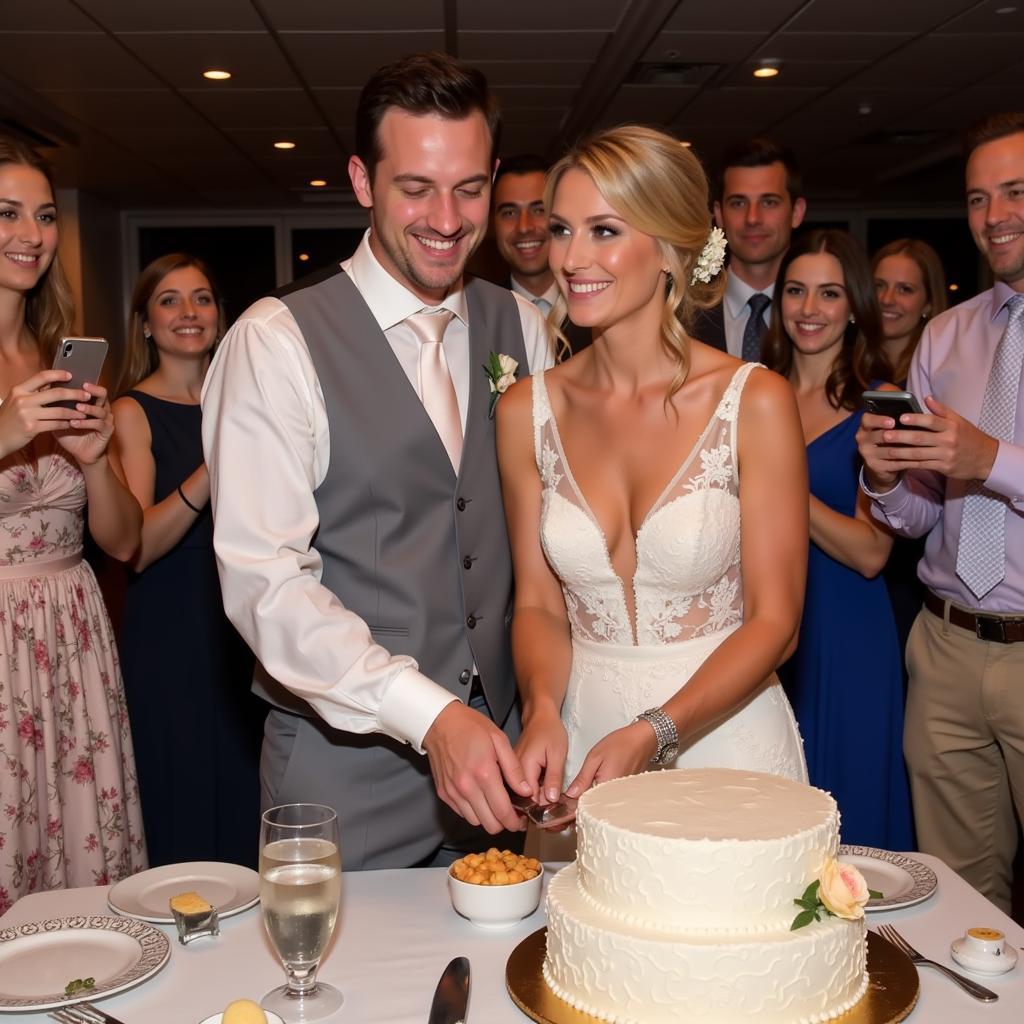Jewish Wedding Food is more than just a meal; it’s a celebration of tradition, family, and community. From the symbolic challah bread to the lively hora dances often fueled by delicious pastries, food plays a central role in Jewish wedding festivities. This article explores the rich culinary traditions surrounding Jewish weddings, offering insights into the symbolic meanings and delicious flavors that make these celebrations so special.
The food served at a Jewish wedding is often a reflection of the couple’s heritage and family traditions. Ashkenazi Jewish weddings, for example, might feature classics like gefilte fish, matzah ball soup, and brisket. Sephardic Jewish weddings, on the other hand, might include dishes like couscous, tagine, and various flavorful spices. Regardless of the specific dishes, the underlying theme is always one of abundance and joy. This is often reflected in the sheer quantity of food presented, symbolizing wishes for a prosperous and fulfilling life together. If you are interested in the varied world of Kosher cuisine, take a look at kosher food in colorado springs.
Exploring Traditional Jewish Wedding Dishes
What are some of the most common dishes gracing Jewish wedding tables? Let’s delve into a few key examples:
- Challah: This braided bread symbolizes the continuity of life and is often dipped in honey, representing the sweetness of the new marriage.
- Gefilte Fish: A poached fish dish, often served with horseradish, it’s a staple in Ashkenazi Jewish weddings.
- Matzah Ball Soup: This comforting soup, with its fluffy matzah balls, is a symbol of nourishment and family tradition.
- Brisket: A slow-cooked beef brisket, often braised with onions and carrots, is a hearty and flavorful main course.
These are just a few examples, and the specific menu can vary greatly depending on family traditions and personal preferences. However, the emphasis on sharing a meal together and celebrating with loved ones remains constant.
What is the Significance of Food in a Jewish Wedding?
Food in a Jewish wedding is deeply symbolic. It represents not only the joining of two individuals but also the merging of two families and communities. The act of sharing a meal is seen as a sacred act, fostering a sense of unity and belonging. The festive atmosphere and abundance of food also symbolize wishes for prosperity and happiness in the new couple’s life together. Want to learn more about Kosher options in other locations? Check out kosher food five towns.
 The bride and groom cutting a multi-tiered wedding cake at a Jewish wedding reception.
The bride and groom cutting a multi-tiered wedding cake at a Jewish wedding reception.
Planning Your Jewish Wedding Menu: Tips and Considerations
Planning the menu for a Jewish wedding can be an exciting but sometimes overwhelming task. Here are a few tips to consider:
- Dietary Restrictions: Kosher dietary laws play a significant role in Jewish weddings. Ensure your caterer is experienced in preparing kosher meals and can accommodate any specific dietary needs of your guests.
- Family Traditions: Incorporate family recipes and traditional dishes that hold special meaning. This is a beautiful way to honor your heritage and create a personalized experience.
- Seasonal Ingredients: Consider using seasonal ingredients to enhance the flavors and freshness of your menu.
Remember to choose a caterer experienced in handling Kosher events and discuss your specific needs and preferences. Check out more Kosher food options at syracuse kosher food.
Frequently Asked Questions about Jewish Wedding Food
What is kosher food? Kosher food adheres to Jewish dietary laws.
Can non-Jewish guests attend a Jewish wedding? Absolutely! Jewish weddings are often welcoming and inclusive events.
Is there always a hora dance at Jewish weddings? The hora is a popular tradition, but not all Jewish weddings include it.
Rabbi David Goldberg, a prominent figure in the Jewish community, emphasizes the importance of food at Jewish weddings, saying, “The shared meal is a central part of our tradition, representing the joining of two families and the beginning of a new chapter.” Food truly becomes a language of love and celebration in these joyous occasions. Similarly, renowned caterer, Sarah Levy, notes, “Creating a Jewish wedding menu is about blending tradition with personal touches, crafting a culinary experience that reflects the couple’s unique story.”
In conclusion, Jewish wedding food is a vibrant tapestry of tradition, symbolism, and delicious flavors. From the challah bread to the lively hora dances, food plays an integral role in creating a memorable celebration. By understanding the significance of these culinary traditions, we can appreciate the rich cultural heritage that makes Jewish weddings so special. Considering exploring more unique Kosher food options? savanna foods and kosher food santa barbara might offer interesting choices.
When you need support, please contact Phone Number: 02437655121, Email: minacones@gmail.com Or visit us at: 3PGH+8R9, ĐT70A, Trung village, Bac Tu Liem, Hanoi, Vietnam. We have a 24/7 customer service team.